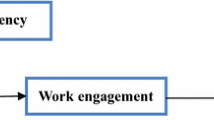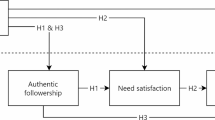Abstract
Followers have often been reported as recipients in previous leadership studies and have usually been associated with negative connotations. Drawing from self-determination theory (SDT) and social exchange theory, we argued that followers can be proactive and that followership behaviors are positively related to leader–follower relationships. The purpose of this study was to examine how followership behaviors promote job performance in terms of perceived supervisor support (PSS) and dyad tenure. Data from a three-wave survey of 219 leader–follower dyads in high-tech manufacturing firms were analyzed using structural equation modeling. The results indicated that active engagement (AE) and independent critical thinking (ICT) were positively related to PSS and that PSS mediated the relationship between followership behaviors and job performance. Additionally, dyad tenure positively moderated the relationship between AE and PSS but negatively moderated the relationship between ICT and PSS. This study revealed that followers’ support for leaders can encourage supervisor support, which may result in high job performance. Furthermore, considering the important roles of followers found in this study, leaders should endeavor to support and promote followership.




Similar content being viewed by others
References
Agho, A. (2009). Perspectives of senior-level executives on effective followership and leadership. Journal of Leadership & Organizational Studies, 16(2), 159–166. https://doi.org/10.1177/1548051809335360
Baker, S. D. (2007). Followership: The theoretical foundation of a contemporary construct. Journal of Leadership & Organizational Studies, 14(1), 50–60. https://doi.org/10.1177/0002831207304343
Benson, A. J., Hardy, J., & Eys, M. (2016). Contextualizing leaders’ interpretations of proactive followership. Journal of Organizational Behavior, 37(7), 949–966. https://doi.org/10.1002/job.2077
Bhanthumnavin, D. (2003). Perceived social support from supervisor and group members’ psychological and situational characteristics as predictors of subordinate performance in Thai work units. Human Resource Development Quarterly, 14(1), 79–97. https://doi.org/10.1002/hrdq.1051
Bjugstad, K., Thach, E. C., Thompson, K. J., & Morris, A. (2006). A fresh look at followership: a model for matching followership and leadership styles. Journal of Behavioral and Applied Management, 7(3), 304–319. https://doi.org/10.21818/001c.16673
Blanchard, A. L., Welbourne, J., Gilmore, D., & Bullock, A. (2009). Followership styles and employee attachment to the organization. The Psychologist-Manager Journal, 12(2), 111–131. https://doi.org/10.1080/10887150902888718
Blom, M., & Lundgren, M. (2020). The (in)voluntary follower. Leadership, 16(2), 163–179. https://doi.org/10.1177/1742715019888078
Carsten, M. K., Uhl-Bien, M., & Huang, L. (2018). Leader perceptions and motivation as outcomes of followership role orientation and behavior. Leadership, 14(6), 731–756. https://doi.org/10.1177/1742715017720306
Carsten, M. K., Uhl-Bien, M., West, B. J., Patera, J. L., & McGregor, R. (2010). Exploring social constructions of followership: A qualitative study. The Leadership Quarterly, 21(3), 543–562. https://doi.org/10.1016/j.leaqua.2010.03.015
Chaleff, I. (1995). The courageous follower: Standing up to and for our leaders. Berrett-Koehler.
Crossman, B., & Crossman, J. (2011). Conceptualising followership: A review of the literature. Leadership, 7(4), 481–497. https://doi.org/10.1177/1742715011416891
Deci, E. L., & Ryan, R. M. (2008). Self-determination theory: A macrotheory of human motivation, development, and health. Canadian Psychology, 49(3), 182–185. https://doi.org/10.1037/a0012801
Dienesch, R. M., & Liden, R. C. (1986). Leader-member exchange model of leadership: A critique and further development. Academy of Management Review, 11(3), 618–634. https://doi.org/10.5465/amr.1986.4306242
Dulebohn, J. H., Bommer, W. H., Liden, R. C., Brouer, R. L., & Ferris, G. R. (2012). A meta-analysis of antecedents and consequences of leader-member exchange: Integrating the past with an eye toward the future. Journal of Management, 38(6), 1715–1759. https://doi.org/10.1177/0149206311415280
Eisenberger, R., Armeli, S., Rexwinkel, B., Lynch, P. D., & Rhoades, L. (2001). Reciprocation of perceived organizational support. Journal of Applied Psychology, 86(1), 42–51. https://doi.org/10.1037/0021-9010.86.1.42
Eisenberger, R., Stinglhamber, F., Vandenberghe, C., Sucharski, I. L., & Rhoades, L. (2002). Perceived supervisor support: Contributions to perceived organizational support and employee retention. Journal of Applied Psychology, 87(3), 565–573. https://doi.org/10.1037/0021-9010.87.3.565
Ford, J., & Harding, N. (2018). Followers in leadership theory: Fiction, fantasy and illusion. Leadership, 14(1), 3–24. https://doi.org/10.1177/1742715015621372
Gatti, P., Tartari, M., Cortese, C. G., & Ghislieri, C. (2014). A contribution to the Italian validation of Kelley’s followership questionnaire. TPM-Testing, Psychometrics, Methodology in Applied Psychology, 21(1), 67–87.
Gesang, E., & Süß, S. (2021). A shift in perspective: Examining the impact of perceived follower behavior on leaders. Scandinavian Journal of Management, 37(2), 101156. https://doi.org/10.1016/j.scaman.2021.101156
Guarana, C. L., & Barnes, C. M. (2017). Lack of sleep and the development of leader-follower relationships over time. Organizational Behavior and Human Decision Processes, 141, 57–73. https://doi.org/10.1016/j.obhdp.2017.04.003
Güntner, A. V., Klonek, F. E., Lehmann-Willenbrock, N., & Kauffeld, S. (2020). Follower behavior renders leader behavior endogenous: The simultaneity problem, estimation challenges, and solutions. The Leadership Quarterly, 31(6), 101441. https://doi.org/10.1016/j.leaqua.2020.101441
Herold, D. M. (1977). Two-way influence processes in leader-follower dyads. Academy of Management Journal, 20(2), 224–237. https://doi.org/10.2307/255396
Homans, G. C. (1961). Social behavior: Its elementary forms. Harcourt, Brace, and World.
Howell, J. M., & Shamir, B. (2005). The role of followers in the charismatic leadership process: Relationships and their consequences. Academy of Management Review, 30(1), 96–112. https://doi.org/10.2307/20159097
Jin, M., McDonald, B., & Park, J. (2016). Followership and job satisfaction in the public sector: The moderating role of perceived supervisor support and performance-oriented culture”. International Journal of Public Sector Management, 29(3), 218–237. https://doi.org/10.1108/IJPSM-05-2015-0101
Jokisaari, M., & Nurmi, J. E. (2009). Change in newcomers’ supervisor support and socialization outcomes after organizational entry. Academy of Management Journal, 52(3), 527–544. https://doi.org/10.5465/AMJ.2009.41330971
Kellerman, B. (2008). Followership: How followers are creating change and changing leaders. Harvard Business Press.
Kelley, R. E. (1992). The power of followership. Doubleday.
Kim, C., & Schachter, H. L. (2015). Exploring followership in a public setting: Is it a missing link between participative leadership and organizational performance? The American Review of Public Administration, 45(4), 436–457. https://doi.org/10.1177/0275074013508219
Lai, J. Y. M., Lam, L. W., & Liu, Y. (2010). Do you really need help? a study of employee supplication and job performance in China. Asia Pacific Journal of Management, 27(3), 541–559. https://doi.org/10.1007/s10490-009-9152-5
Leroy, H., Anseel, F., Gardner, W. L., & Sels, L. (2015). Authentic leadership, authentic followership, basic need satisfaction, and work role performance: A cross-level study”. Journal of Management, 41(6), 1677–1697. https://doi.org/10.1177/0149206312457822
Lun, V. M., Fischer, R., & Ward, C. (2010). Exploring cultural differences in critical thinking: Is it about my thinking style or the language I speak? Learning and Individual Differences, 20(6), 604–616. https://doi.org/10.1016/j.lindif.2010.07.001
Matthews, S. H., Kelemen, T. K., & Bolino, M. C. (2021). How follower traits and cultural values influence the effects of leadership. The Leadership Quarterly, 32(1), 101497. https://doi.org/10.1016/j.leaqua.2021.101497
Meindl, J. R., Ehrlich, S. B., & Dukerich, J. M. (1985). The romance of leadership. Administrative Science Quarterly, 30(1), 78–102. https://doi.org/10.2307/2392813
Oc, B., & Bashshur, M. R. (2013). Followership, leadership and social influence. The Leadership Quarterly, 24(6), 919–934. https://doi.org/10.1016/j.leaqua.2013.10.006
Podsakoff, P. M., MacKenzie, S. B., Lee, J., & Podsakoff, N. P. (2003). Common method biases in behavioral research: A critical review of the literature and recommended remedies. Journal of Applied Psychology, 88(5), 879–903. https://doi.org/10.1037/0021-9010.88.5.879
Ryan, R. M., & Deci, E. L. (2000). Self-determination theory and the facilitation of intrinsic motivation, social development, and well-being. American Psychologist, 55(1), 68–78. https://doi.org/10.1037/0003-066X.55.1.68
Schneider, A., Gardner, W. L., Hinojosa, A., & Marin, A. (2014). Emotional responses of leaders to passive versus active members. Leadership, 10(4), 412–436. https://doi.org/10.1177/1742715013504424
Shanock, L. R., & Eisenberger, R. (2006). When supervisors feel supported: Relationships with subordinates’ perceived supervisor support, perceived organizational support, and performance. Journal of Applied Psychology, 91(3), 689–695. https://doi.org/10.1037/0021-9010.91.3.689
Uhl-Bien, M., Riggio, R. E., Lowe, K. B., & Carsten, M. K. (2014). Followership theory: A review and research agenda. The Leadership Quarterly, 25(1), 83–104. https://doi.org/10.1016/j.leaqua.2013.11.007
Vanderslice, V. J. (1988). Separating leadership from leaders: An assessment of the effect of leader and follower roles in organizations. Human Relations, 41(9), 677–696. https://doi.org/10.1177/001872678804100903
Xu, A. J., Loi, R., Cai, Z., & Liden, R. C. (2019). Reversing the lens: How followers influence leader–member exchange quality. Journal of Occupational and Organizational Psychology, 92(3), 475–497. https://doi.org/10.1111/joop.12268
Xu, S., Yang, T., Guo, R., & Zhang, W. (2019). The antecedents and consequences of employees’ followership behavior in social network organizational context: A longitudinal study. EURASIP Journal on Wireless Communications and Networking. https://doi.org/10.1186/s13638-019-1565-3
Yukl, G., & Van Fleet, D. D. (1992). Theory and research on leadership in organizations. In M. D. Dunnette & L. M. Hough (Eds.), Handbook of Industrial and Organizational Psychology (pp. 147–197). Consulting Psychologists Press.
Zhang, B., & Morris, J. L. (2014). High-performance work systems and organizational performance: Testing the mediation role of employee outcomes using evidence from PR China. The International Journal of Human Resource Management, 25(1), 68–90. https://doi.org/10.1080/09585192.2013.781524
Author information
Authors and Affiliations
Corresponding author
Ethics declarations
Ethics Approval (include appropriate approvals or waivers)
All procedures performed in this study were in accordance with the ethical standards for research involving human participants.
Consent to Participate (include appropriate statements)
Informed consent was obtained from all participants for being included in the study.
Consent for Publication (include appropriate statements)
We, the undersigned, give our consent for the publication of identifiable details, which can include figures and tables within the text “How do followership behaviors encourage job performance? A longitudinal study” to be published in Current Psychology.
Conflicts of interest/Competing interests
(include appropriate disclosures).
The authors declare no conflict of interest.
Additional information
Publisher's Note
Springer Nature remains neutral with regard to jurisdictional claims in published maps and institutional affiliations.
Rights and permissions
About this article
Cite this article
Shen, L., Abe, T. How do followership behaviors encourage job performance? A longitudinal study. Curr Psychol 42, 14652–14662 (2023). https://doi.org/10.1007/s12144-021-02545-2
Accepted:
Published:
Issue Date:
DOI: https://doi.org/10.1007/s12144-021-02545-2




